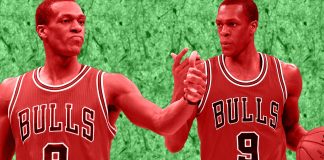Of all the remaining free agents, Rajon Rondo is one of the most recognizable. And just because the Chicago Bulls parted ways doesn’t mean he’s useless.
Rajon Rondo is coming off a tumultuous season. It’s not all his fault. The Bulls weren’t the most well-run franchise, and whatever issues they had up top permeated the locker room. Jimmy Butler, Dwyane Wade and Rondo had their problems, whether it be with each other or the coaching staff. Because of these incidents, Rondo’s role with the team became rather limited. There was a stretch where Fred Hoiberg benched him, and, for the season as a whole, he averaged the fewest minutes (26.7) since his rookie season.
Whatever went on behind closed doors impacted Rondo’s play. And it was noticeable. He averaged just 7.8 points to go along with 6.7 assists and 5.1 rebounds. Additionally, he connected on 40.8 percent of his shots overall. Rondo’s poor play was flat bizarre. The same guy led the league in assists a night in 2016 with 11.7 and was a walking double-double. Moreover, Rondo was a fairly reliable offensive player who boasted a field goal clip of 45.4, bolstered by something we had never seen before — accuracy from downtown. In his one full season with the Sacramento Kings, the former All-Star nailed 36.5 percent of his 2.4 attempts from downtown. Perimeter shooting was never a part of Rondo’s game. This season, despite everything, he improved it by 1.1 percentage points.
Related: Rondo Found Second Life In Sacramento
The falling out that Rondo and the Bulls had is nothing new. Rondo landed in Sacramento after being unhappy with the Dallas Mavericks. That situation was far worse. He and Rick Carlisle were like oil and water, and that led to Rondo quitting on his team down the stretch of the regular season and into the playoffs.
During his time in Boston, quarrels weren’t publicized as they are today. There is good reasoning for that. Each NBA locker room has tension when things aren’t going well; it’s just how it is. It sucks losing a couple of games in a row, especially when high-talent guys who aren’t used to it make up your team. The Celtics had Kevin Garnett, Ray Allen and Paul Pierce during Rondo’s tenure. Additionally, they had Doc Rivers. Of those five guys, four are going into the Hall of Fame damn-near unanimously.
Boston didn’t start to “crumble” until the end of the decade. By the time that happened, they had gone to the Finals twice and won the title in in 2008. Rondo was a vital piece to their success. His Einstein-like IQ allowed him to orchestrate the offense with ease. On top of that, he could execute any pass at any time, often sliding pocket passes through two defenders like a rabbit hopping through a hole in a fence. Rondo led the league in assists a game twice with 11.7 in 2012 and 11.1 in 2013, and that is what made him a triple-double threat.
He never had to shoulder a scoring load because of the guys around him. The Celtics should thank the Lord for that. Like any terrific point guard, Rondo was able to get into the paint by way of a screen or a quick dribble move. Basketball Reference estimates that he converted on 60.8 percent of his shots inside of three feet, which is solid. The lack of a three-ball was painfully obvious, and Rondo did his best to be reliable from mid-range. For the most part, it worked.
Defenses would’ve defended him much differently if the supporting cast didn’t feature who it did. That’s for sure.
Although Rondo generated numerous highlights on offense, his ability to play lockdown defense helped him stand out even more. Boston, as a team, on that end were stellar. Garnett anchored the middle and was a huge tone-setter, which allowed everyone to play uber-aggressively on the perimeter because they knew he had their backside. Rondo benefitted greatly from this, and he was already a pesky defender. Swift hands, outstanding anticipation and a ridiculous 6-9 wingspan (according to Sports Science) made him a nightmare for offensive point guards. In 2010, Rondo collected 189 steals in 81 games, which worked out to an average of 2.3 a night. Both of those led the NBA. He also landed on his second of four All-Defensive teams.

Once the postseason rolled around, Rondo picked up his play. He made the playoffs five times a Celtic, highlighted by his two Finals appearances. In those 96 games from 2008-2012, he averaged 14.5 points, 9.2 assists, 6.0 rebounds and 2.0 steals, becoming the only player to do so over that stretch, according to Basketball Reference. This year, Rondo had two dazzling playoff games before getting hurt, collecting 23 points, 20 assists, 17 rebounds and seven steals.
With big game typically comes a big personality. Rondo may not have been as demonstrative as Garnett or a leader like Pierce, but he was special, and it stemmed from his other-worldly IQ. I don’t know if it translates to other subjects, but Rondo is wildly intelligent about basketball’s Xs-and-Os. He’d excel as a coach.
Doc Rivers understood the kind of player he had. Rondo is the epitome of a coach on the floor, and he wanted to control the game as such. Rivers, who’s outstanding (during the regular season), never got in Rondo’s way if he didn’t need to. That’s another reason Rondo had a revival with the Kings. Their situation was different than Boston’s, but George Karl gave Rondo he keys to a Ferrari on the Autobahn. With Dallas and Chicago, that wasn’t the case.
Also Read: Dwyane Wade Said Rondo Is The Best PG He’s Played With
Any team who signs Rondo has to be okay with his demands on the offensive end. There have been rumors about the Lakers, Pelicans and Knicks having interest, and going to New Orleans would be quite exciting. They just re-signed Jrue Holiday, and he, along with Anthony Davis and DeMarcus Cousins, drive the offense. Alvin Gentry could drop Rondo in and let him work his magic. His days with the Celtics made him numb to playing with three other options, and that wouldn’t get on his nerves. Holiday would get to work away from the ball more, and Cousins and Rondo already are familiar with each other from their time in Sacramento. I doubt it’d take Davis long to get acquainted with the former All-Star.
Should the Lakers or Knicks decide to take a shot, I don’t believe it’d go as planned. New York raises far more red flags because they have no idea what they’re doing. Rondo wouldn’t thrive in already murky water. If he went there and things only got worse, what would stop the majority of people from placing the blame on him?
Los Angeles wouldn’t be the worst place in the world. However, they already have Lonzo Ball, who has a similar offensive style to Rondo. It would be positional overload, even though the team would be more than capable of accommodating him.

Rondo just turned 31 this past February, so his battle with Father Time is already started. He had a down season last year, but, like 99 percent of the guys in the NBA, his situation needs to be right for a team to get the most out of it. An already dysfunctional franchise with no identity wouldn’t benefit from signing Rondo. Moreover, as we’ve already seen, the coach has to be comfortable with relinquishing some of his decision-making power.
Despite what’s transpired over the last couple of seasons, Rondo reminded us in the playoffs that he can still play. Any team that picks him up is going to get a proven floor general who can make plays when he has the ball. Of course, they have to embrace his limitations. He’s not going to get out and get 17 a night — Rondo was never that kind of player. However, if he’s got pieces around him, he’ll be more than capable of thriving. On the plus side, the improved stroke from downtown is a new wrinkle to his game that makes him just a touch more dynamic; gone are the days of defenders being able to sag seven or eight feet off of him.
On defense, Rondo still has a couple of good years left. As he ages, though, the attributes that make him feared are going to erode. At least he’ll have his brain.
Heading into his 12th season, teams across the NBA know what they’re getting when they sign Rondo. He’s a difference-maker offensively who has had issues with certain organizations. Additionally, his leadership is rather underrated, and the way he understands the game is rivaled by few in today’s league. While Rondo can still help someone’s organization, it’s up to the front office to decide if he’s the right guy for them and they’ll have to have the cache available to avoid overworking the aging floor general.
Start a conversation with me on Twitter

